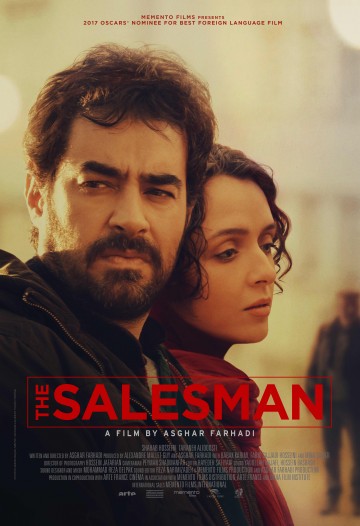Originally written for:
Directed and Written by Asghar Farhadi
Starring: Taraneh Alidoosti, Shahab Hosseini, Babak Karimi
Fresh off winning an Oscar for best foreign film (why these films can’t be considered for ‘Best Picture’ is a frustration best kept for another time), The Salesman eludes simple convention and wrings the most out of a fairly standard narrative. It does this by focusing on character, and by doing so it depicts the mental degradation a man experiences on a one-way road to revenge.
During a production of the play Death of a Salesman, a couple, Rana and Emad, suddenly find that their house is crumbling, and an early extended shot probing out of one of the cracked windows shows us why this is happening. After successfully evacuating, the couple are forced to quickly find a new place, and after mentioning that they are close to sleeping on the stage of their set, Babak – a colleague working with them – offers to help.
Upon seeing the new house, the couple decide it will be a temporary arrangement. Unbeknownst to them, the house was originally the home of a prostitute. This arrangement didn’t go well, as when the new couple are introduced to their new neighbours, once out of earshot the neighbours ask Babak to make sure that this doesn’t turn out like the ‘last one’. This missing detail proves to be key when the couple move in.
A HEALTHY DOSE OF REVENGE?

Cleverly, The Salesman does not show what happens at all – the last thing we see is Rana opening the door for who she thinks is her husband, with the camera lingering on the door, ever so slightly opening further before the film cuts to her husband, who is making his way home and arrives only to find blood on the steps leading to his apartment; his wife gone. The way this is executed casts doubt over the entire situation. Was she raped? What exactly happened?? Is she trying to get back at her husband in the only way she knows how?
Thanks to the help of their new neighbours, Rana is safe in a hospital. It transpires that the likely assailant was a customer of the previous occupant. One of many things that begin to fuel Emad’s rage, as he, slightly unhinged, demands of Babak why he wasn’t told about the previous occupant. Babak is graceful and offers to help, but Emad doesn’t want to hear it.
Meanwhile, his wife Rana doesn’t want to call the police, and neither does Emad. They both have very different reasons for why they think this way however, causing their relationship to slowly fracture. Emad is so entangled in his quest for revenge, he fails to notice this in any way, despite Rana’s attempts to stop him. Emad is taking the situation personally, despite the fact that his wife was the one assaulted. As if she were his property.
GENDER INEQUALITY IN IRAN

Emad taking the rape of his wife personally is part of an obvious theme running through The Salesman: the treatment of wives/women by men in Iranian society. We see a small glimpse of this early, as when in a packed taxi-cab, a woman sitting next to Emad first asks him to move over, despite the fact he is squashed against the door already. She soon asks if she can switch seats with the young man in the front passenger seat. Even though he did nothing to cause this, her reaction would seem to be the consequence of a past interaction with a man gone wrong.
More overtly though is the way in which Emad begins to treat his wife, becoming increasingly dismissive of her post-traumatic stress, taking it upon himself to hunt down the attacker outside of official protocol, which he believes will be a waste of time. Rana wants to put it all behind her, but her husband refuses to let this happen. Soon after the attack, Rana tries to perform her role in the play, but eventually leaves the stage in tears. Emad again doesn’t empathise with her situation, rather, he expects her to fall in line and get over it.
THE LEADS
Shahab Hosseini, playing Emad, is a big reason in why The Salesman is as powerful as it is, despite its relative simplicity. His portrayal of a man rapidly shifting through emotions like a greyhound processing the grieving process is incredibly believable. He begins as a happy, married, popular school-teacher who is starring in a play. After his wife is attacked, his emotions take on the traits of a pinball, and Shahab clearly depicts where his character is emotionally, often without the need for words. His ability to truly inhabit his character is a big part of why the ending of the film is so gut-wrenching.
The gravity of his performance wouldn’t be possible without the on-screen chemistry he shares with Taraneh Alidoosti as his wife Rana. Or perhaps more accurately, a lack of chemistry. The couple initially seem happy, but their depiction of a couple slowly growing apart is incredibly believable. Both actors inject this dramatic story with a realistic tone, and this is further cemented by every other performance in the movie. There are no weak links, including a few child actors.
Superbly shot and produced, there is little to complain about regarding this fine film. The pacing is very deliberate, as new pieces of information are methodically fed to the audience. This isn’t for everyone, it has a bit of a ‘slow-burn’ feel to it, but if you are looking for a revenge film that subverts the genre’s norms, this is certainly one to watch. Fans of last years fantastic Elle, which also subverted some revenge movie norms, should give this one a watch.










